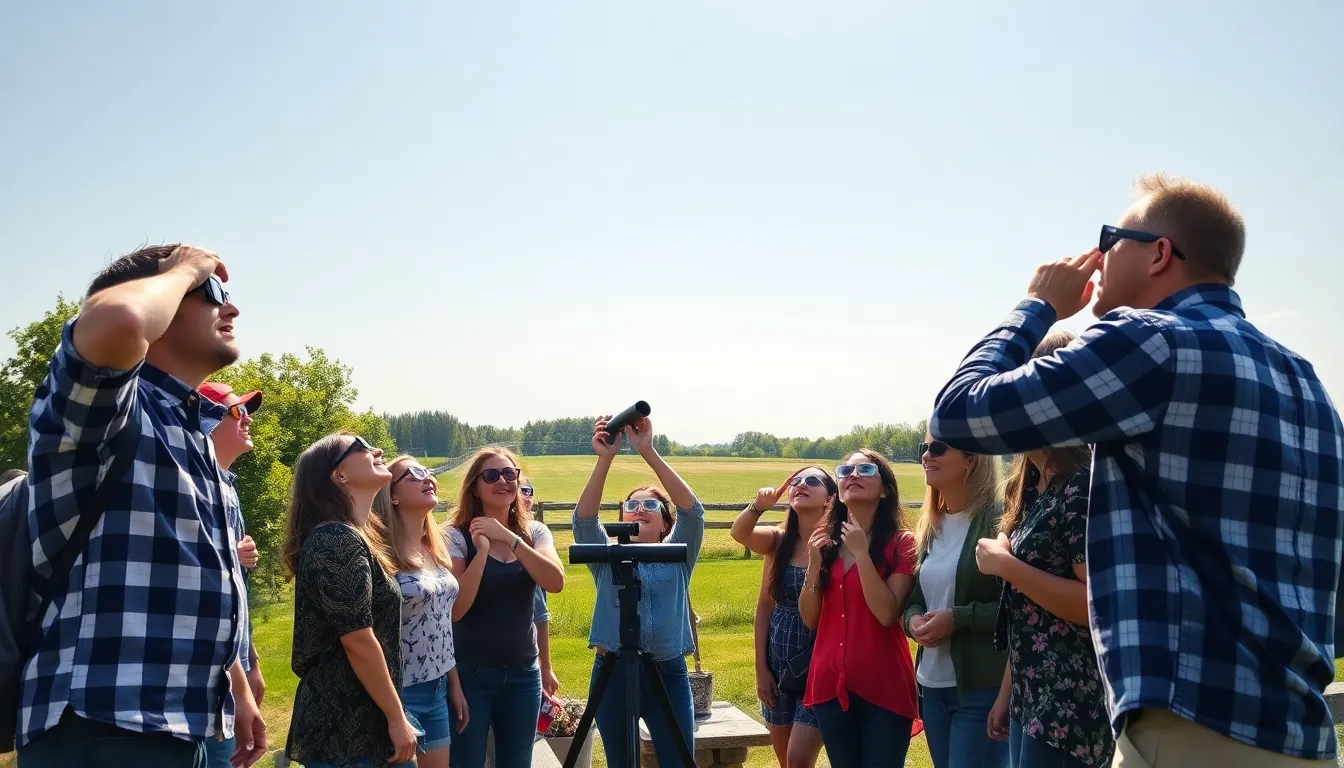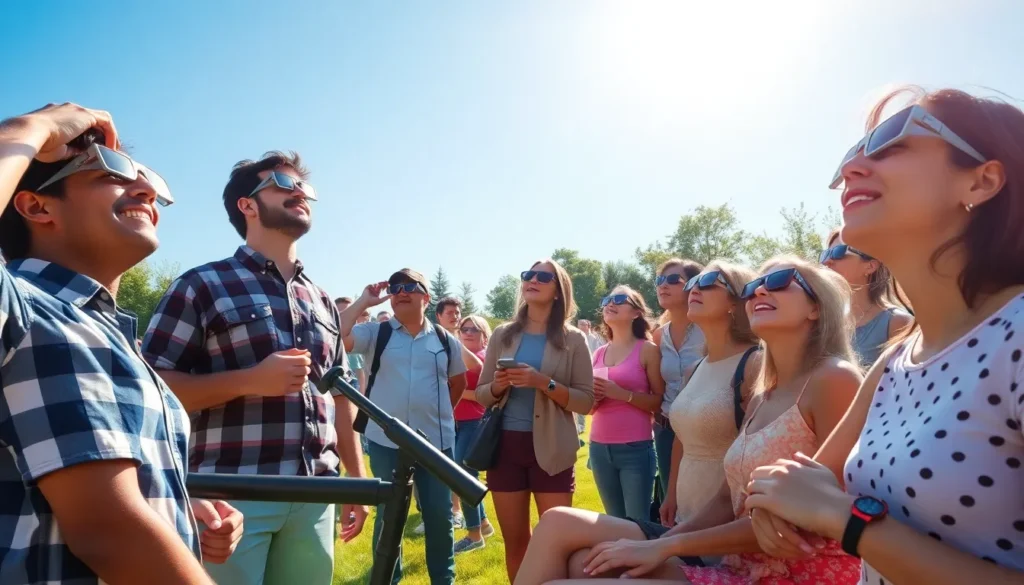Table of Contents
ToggleTomorrow, the cosmos is throwing a party, and you won’t want to miss it! An eclipse is set to grace the skies, transforming the sun into a celestial snack. But wait—what time does this cosmic event kick off? Knowing the exact time can mean the difference between staring at a bright sky or witnessing a breathtaking spectacle.
Overview of the Eclipse
An eclipse represents a remarkable alignment of celestial bodies. This event, which occurs tomorrow, provides an opportunity to witness the sun, moon, and Earth in a unique configuration. Different regions will experience varying phases of the eclipse, including total, partial, or annular forms. Viewing this cosmic phenomenon requires awareness of the specific timing in each location.
The total eclipse phase will completely obscure the sun in certain areas, offering a spectacular sight. Timing varies; for instance, in cities like Nashville and Dallas, the eclipse may reach totality around 1:30 PM CDT. Observers must check local times to experience the full effect.
Partial phases occur before and after totality, showcasing a gradual covering of the sun. Many people will witness a crescent-shaped sun during these phases. The timing of the partial eclipse starts slightly before totality, with some observers seeing this majestic sight as early as 12:15 PM CDT.
Safety is critical when viewing an eclipse. Specialized glasses or indirect viewing methods protect the eyes from damaging sunlight. It’s essential to confirm visibility conditions in specific locations to maximize the viewing experience.
Preparation enhances enjoyment of the eclipse. Planning includes checking local weather forecasts, determining excellent viewing spots, and securing solar viewing glasses. Engaging with communities and sharing the experience adds to the excitement.
Timing and location play key roles in experiencing this eclipse. Knowing when to look skyward will greatly enhance the chance to enjoy this remarkable event.
Importance of Timing

The timing of the eclipse plays a crucial role in the viewing experience. Knowing when to look up ensures observers don’t miss this mesmerizing event.
Why Knowing the Time Matters
Awareness of the exact time helps viewers prepare for the different phases of the eclipse. Observing the totality phase, for example, offers a completely unique experience, while identifying the start of the partial phase allows for early setup. Depending on location, the timing may vary significantly, making precise knowledge essential. Cities like Nashville and Dallas experience totality around 1:30 PM CDT. Meanwhile, partial phases begin earlier, at 12:15 PM CDT.
Impact on Viewing Experience
The eclipse’s timing influences not just when people gather but also how they engage with the event. Coordinated viewing can lead to shared excitement among friends and families. Optimal timing allows for appropriate arrangements, such as setting up telescopes or finding safe viewing spots. People in different regions may experience different phases, which makes the experience even more intriguing. Effective planning also involves checking local weather forecasts to minimize disruptions. Experience the beauty of alignment when the sun, moon, and Earth connect, creating a rare moment in time.
What Time Is the Eclipse Tomorrow?
The eclipse occurs tomorrow, and knowing the precise time is essential for spectators. Observers should refer to local timing, as it varies by region.
Specific Timing by Location
Cities experiencing totality, like Nashville and Dallas, will see maximum coverage around 1:30 PM CDT. For cities further afield, the partial phases kick off as early as 12:15 PM CDT. Locations east of Nashville may notice the event beginning slightly later. Those in New York can expect partial phases to start around 2:15 PM EDT. It’s crucial to adjust plans depending on local conditions to ensure the best possible viewing.
Duration of the Eclipse
When considering the length of the eclipse, total eclipses can last for approximately 2 to 3 minutes at maximum totality. Partial eclipses may extend for several hours, depending on geographic proximity to the path of totality. Observers could experience different durations based on whether they see total, annular, or partial phases. Typically, the entire event unfolds in roughly 3 to 4 hours, allowing ample time for excitement and anticipation. Timing each phase accurately enhances the overall experience for everyone involved.
Preparation for Viewing
Preparation enhances the experience of viewing the eclipse. Observers need to gather essential items beforehand for a smooth event.
Necessary Tools and Equipment
Observers require solar viewing glasses specifically designed for eclipse watching. These glasses filter harmful rays and provide a safe way to look directly at the sun. In addition to glasses, viewers might consider eclipse viewers or pinhole projectors as alternative methods. For those planning on recording the event, a camera with solar filters becomes critical. Binoscopes or telescopes equipped with proper solar filters allow for a closer look at the eclipse. Having a blanket or chair for comfort adds to enjoyment when watching the spectacle.
Safety Precautions
Safety remains paramount during an eclipse. Looking directly at the sun without proper protection can cause severe eye damage. Observers must wear solar viewing glasses at all times when watching the sun. Even during partial phases, taking precautionary measures is essential. It’s advisable to avoid using regular sunglasses, as they do not offer adequate protection. Checking weather conditions helps in finding a clear viewing spot, as overcast skies can obstruct visibility. Planning ahead includes setting up equipment and securing a safe location well before the eclipse starts to avoid last-minute complications.
Tomorrow’s eclipse promises to be a breathtaking spectacle that shouldn’t be missed. With careful planning and awareness of the timing, viewers can fully appreciate this extraordinary cosmic event. By preparing with the right safety gear and finding a suitable viewing location, observers can enhance their experience and share the excitement with others. As the sun, moon, and Earth align, this rare moment in time offers a chance to connect with the wonders of the universe. Don’t forget to look up and enjoy the magic of the eclipse.





